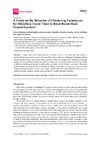Identificador persistente para citar o vincular este elemento:
https://accedacris.ulpgc.es/jspui/handle/10553/70815
| Título: | A study on the behavior of clustering techniques for modeling travel time in road-based mass transit systems | Autores/as: | Cristóbal, Teresa Padrón Morales, Gabino Quesada Arencibia, Francisco Alexis Alayón Hernández, Francisco Javier De Blasio , Gabriele Salvatore García Rodríguez, Carmelo Rubén |
Clasificación UNESCO: | 3327 Tecnología de los sistemas de transporte 120304 Inteligencia artificial |
Palabras clave: | Clustering Data mining Intelligent transport systems Mass transit systems |
Fecha de publicación: | 2019 | Publicación seriada: | Proceedings (MDPI) | Conferencia: | 13th International Conference on Ubiquitous Computing and Ambient Intelligence - UCAmI 2019 | Resumen: | In road-based mass transit systems, the travel time is a key factor affecting quality of service. For this reason, to know the behavior of this time is a relevant challenge. Clustering methods are interesting tools for knowledge modeling because these are unsupervised techniques, allowing hidden behavior patterns in large data sets to be found. In this contribution, a study on the utility of different clustering techniques to obtain behavior pattern of travel time is presented. The study analyzed three clustering techniques: K-medoid, Diana, and Hclust, studying how two key factors of these techniques (distance metric and clusters number) affect the results obtained. The study was conducted using transport activity data provided by a public transport operator. | URI: | https://accedacris.ulpgc.es/handle/10553/70815 | ISSN: | 2504-3900 | DOI: | 10.3390/proceedings2019031018 | Fuente: | Proceedings (MDPI) [ISSN 2504-3900], v. 31 (1), 18 |
| Colección: | Artículos |
Visitas
311
actualizado el 15-ene-2026
Descargas
206
actualizado el 15-ene-2026
Google ScholarTM
Verifica
Altmetric
Comparte
Exporta metadatos
Los elementos en ULPGC accedaCRIS están protegidos por derechos de autor con todos los derechos reservados, a menos que se indique lo contrario.
